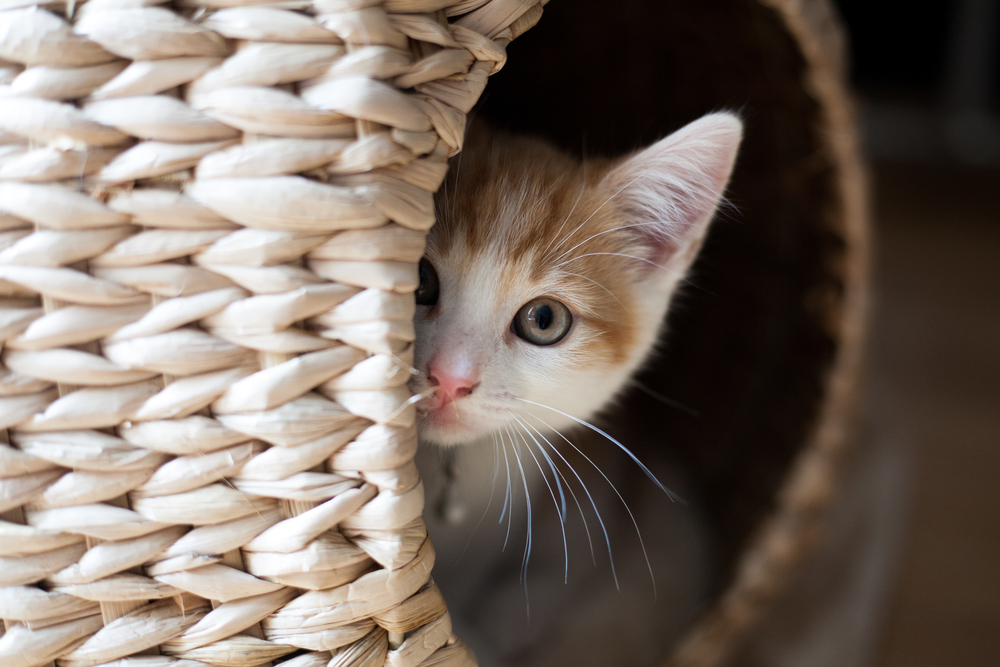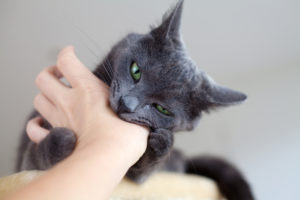We all want our kitties to live their best life! Even though we try our best to provide them with everything they need to be happy, secure, healthy, and safe, sometimes our cats can still be stressed. But the question still remains: how can you tell if your kitty is experiencing stress or cat anxiety symptoms?
Stress and Behavior Changes
Since our cats can’t actually talk to us (or to each other!), they express their mental state through their behavior. You probably know that a cat with his ears flattened and pupils dilated is stressed or scared—but what are some more subtle changes we may see?
The first rule is: know your cat! Some cats have clown-type personalities and love getting into everything or spying on you from all around the house. Some cats are shy by nature, and prefer to slink around the house stealthily or to be curled up at the other end of the couch instead of on your lap. Finally, some cats are true cuddle-bugs who always manage to snuggle up next to or on top of you, no matter where you are or what you are doing at the time!
Hiding and Antisocial Behavior
Any time your feline friend seems to have a dramatic change from one personality type to another, it is possible that feline stress is the cause—especially if the change lasts longer than one or two days. If your cat always wants to be the center of attention, and instead is hiding in the closet all day and refuses to come out—then he is likely stressed, scared, or physically ill. It’s worth a call to your veterinarian to determine which is more likely, based on what else is happening around the house.
Displacement Behavior
Stressed-out cats who have little control over their environment will often show us “displacement behaviors.” Kitties who engage in displacement behaviors are taking out their frustration in a physical way—just like some humans do! Unfortunately, these behaviors are often destructive to household items, human or animal housemates, or to kitty’s own physical health.
Examples of displacement behavior as a stress response can include chewing or scratching furniture and clothes, excessive vocalization and “crying,” and even obsessive licking/grooming behavior. It should be noted that for kitties licking themselves bald/excessive grooming is most often a sign of an itchy skin problem—not an anxiety issue—so, as a cat owner, please check with your veterinarian if this is the only symptom of chronic stress that you are seeing. They may also start chasing or attacking other animals in the household. Understanding how to calm down a cat with this type of behavior will likely involve pinpointing their source of stress.
Going Potty Outside the Litter Box
Wondering, “Why is my cat pooping outside of the litter box?” One of the most common signs of cat stress is a change in their bathroom habits. If your cat is marking their territory by urinating around the house or on the walls instead of their litter tray, then it may be due to stress and feeling insecure. Similarly, anxious cats will often defecate (poop) outside of their litter box as well—and may even experience diarrhea!
Make Sure Your Kitty Is Healthy and Happy
If you’ve noticed your cat exhibiting any of these symptoms, chatting with one of our AskVet veterinarians can help to determine if a mental health issue is to blame, or if a physical exam and lab testing for physical ailments might be needed.
Our AskVet Veterinarians are available to discuss all of your pet’s needs 24 hours a day, 7 days a week. Whether you have an immediate need, want to ask why does my cat randomly bite me, or are looking to improve your pet’s overall wellbeing, just sign into your account and one of our friendly and knowledgeable veterinary experts will attend to your needs, no appointment required!
Written by:
Allison Ward, DVM
Dr. Allison Ward grew up in the suburbs of Washington, D.C. and started working in veterinary hospitals when she was 14 years old. After graduating from veterinary school in 2011, she completed a small animal rotating internship in New Jersey, followed by a neurology/neurosurgery internship in Miami. After completing this advanced training, Dr. Ward then moved on to general small animal practice. Dr. Ward’s professional interests include feline medicine, neurology, and pain management. Her passion for educating pet owners carries over into her work with AskVet, and she loves being able to help pets and their parents at all times of the day (and night!). She currently resides in sunny south Florida with her two cats, Larry and George.








